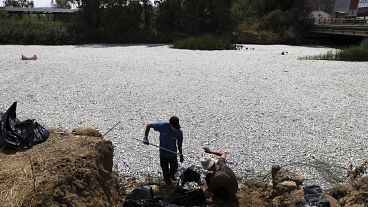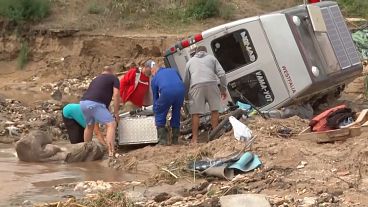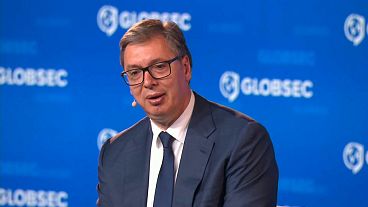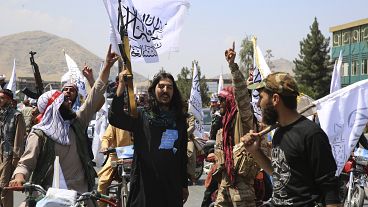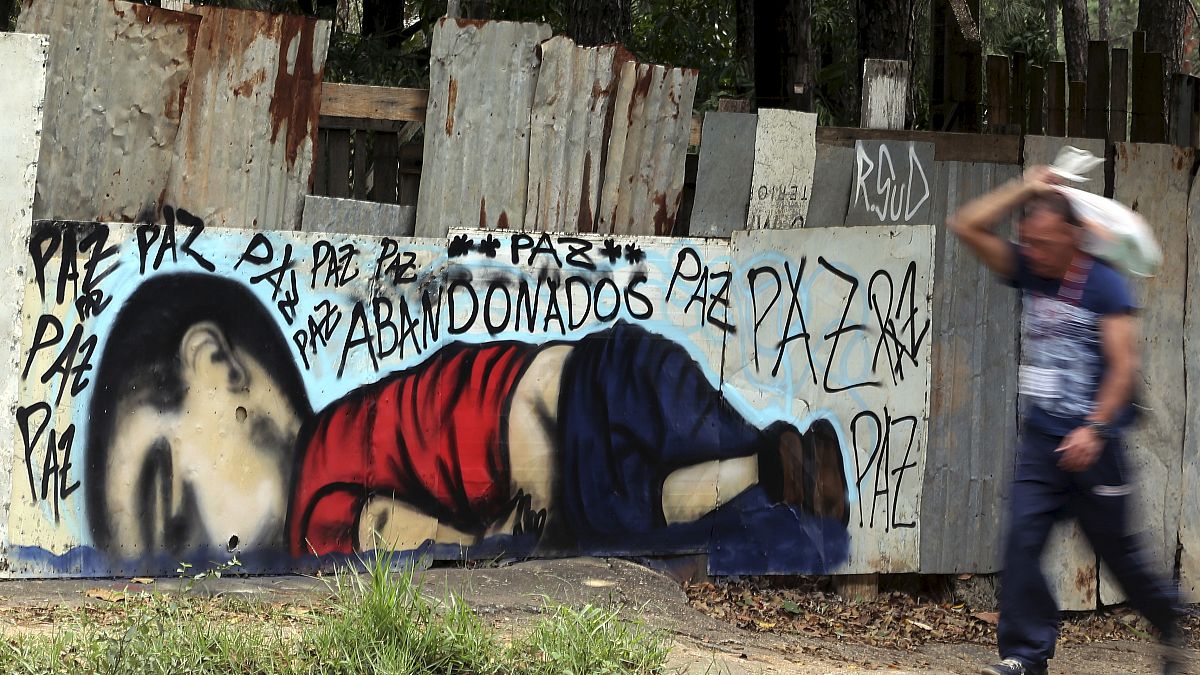More than 300 migrant children have died attempting the Turkey-Greece sea crossing in the six months since the much-publicised death of Syrian
More than 300 migrant children have died attempting the Turkey-Greece sea crossing in the six months since the much-publicised death of Syrian youngster Alan Kurdi, Euronews can reveal.
The image of the three-year old washed up on a Turkish beach on September 2 changed public opinion and reignited EU efforts to deal with the refugee influx.
Brussels extended a scheme to relocate migrants from some of the worst-hit countries in the EU and allowed the temporary reintroduction of border controls in a bid to manage the crisis.
How can we stop hundreds more refugee children drowning at sea?
Read more: https://t.co/XThg6mtcyG
Please RT
— Chris Harris (@lyonanglais) March 1, 2016
Earlier in the year the Commission upped its search and rescue operations at sea and allocated more than 70 million euros in emergency funding.
Yet children are still drowning in waters between Turkey and Greece, averaging around two-a-day between September last year and January.
October was the worst month, with 84 children losing their lives, half of them on one of the deadliest days, Wednesday 28th.
‘Intolerable tragedy’
The mounting death toll comes amid a trend of more women and children attempting to cross from Turkey to Greece.
In June last year one-in-ten of refugees and migrants registered at the border of Greece and FYOR Macedonia were children, according to the International Organization for Migration (IOM).
That figure rose to just one-in-three by October, a change driven by refugee families wanting to reunite.
Sarah Crowe, spokeswoman for UNICEF, told Euronews (you can listen to the full 21-minute interview here) men had made the crossing in 2015 and that their families were now joining them.
She added: “One mother I spoke to had given birth on the border of Turkey and Greece and she had her 15-day old baby with her and she was going to meet her husband in Germany. This tends to be a story you hear a lot. Families looking to reunite.
“Sadly we have seen children continue to drown in the Mediterranean. It has become now one of the most dangerous bodies of water in the world. Two children are dying every single day, on average.
“And that’s just an intolerable tragedy that children can escape war and conflict with the hope of this odyssey and new life in a new country, only to die at sea.
“Our message is really that there has to be much stronger emphasis on enhancing the safety of these routes.”
MOAS, an NGO dedicated to saving the lives of migrants and refugees at sea, says safety of the refugee boats are worse than ever.
Christopher Catrambone, the charity’s founder, said: “What we are witnessing in the Aegean Sea is even more horrendous than what we experienced in the [central] Mediterranean.
“Due to the shorter distances, smugglers take increased risks at the expense of the refugees, often giving them worthless lifejackets and inflatable boats that simply cannot reach shore.”
Map: Migrant children deaths at sea since Alan Kurdi tragedy
Click the coloured icons or zoom in for more detail. Approximate locations only. Where data is sketchy, nearest land location chosen. Source: International Organization for Migration
Slow progress
Three weeks after the photograph of Alan Kurdi hit the headlines, European Commission President Jean-Claude Juncker released a statement: “The first priority today is and must be addressing the refugee crisis.
“The decision to relocate 160,000 people from the most affected Member States is a historic first and a genuine, laudable expression of European solidarity. It cannot be the end of the story, however. It is time for further, bold, determined and concerted action by the European Union, by its institutions and by all its Member States.”
Despite Juncker’s words, half a year later, just 583 of the 160,000 refugees have been relocated.
Ms Crowe said slow progress in terms of relocation and asylum applications was leaving child refugees in an ‘extremely vulnerable situation’.
She said: “When it comes to children in particular, we’ve seem them being delayed and unaccompanied minors are not sure where they can go and what their rights are.
“Therefore they are extremely vulnerable to being trafficked.
“Talk of relocation and other efforts really needs to take into account the reality of the sheer scale and scope of the crisis and the numbers.”
What needs to be done?
NGOs have called for more resources to be committed to search and rescue operations at sea, while praising progress made in other areas of managing the crisis.
Ms Crowe said: “First and foremost we have to look at the countries of origin and that’s really the failure to resolve these conflicts, that lies at the heart of it. If there was peace in Syria, Afghanistan, Iraq and these places weren’t dangerous, people would not be fleeing.
“We’re seeing a huge difference in how it [the refugee crisis] is being managed. There has been huge progress, especially on the land routes. But it’s intolerable that you still have children drowning at sea when there must be and can be a way of managing this in the countries of origin.”
A spokeswoman for MOAS said it launched operations in the Aegean on December 23, 2015, and has helped more than 1,000 people.
She added: “It’s unfortunate that the world has almost grown accustomed to see and hear about children dying off the coasts of Europe. It is sad that it has almost become the new normal. This is also something MOAS strives to fight back, we want to keep reminding public opinion and policy makers that many ‘Aylan Kurdi’ have died and many more will die if we fall back into indifference.”
A spokeswoman for the European Commission told Euronews: “Political responsibilities need to be assumed at highest level in all Member States to ensure that the agreed coordinated European response can address the refugee crisis swiftly and efficiently on the ground by national and local authorities with the EU support and assistance that has been made available over the past months.”

